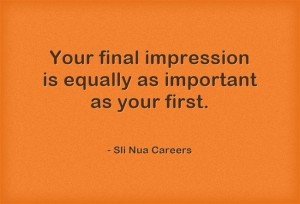By Sabina Trench, Career Coach, Sli Nua Careers

Entrance
At the start of any interview, you can almost bank on being asked to, ‘Talk us through your CV’ or ‘Tell us a little bit about yourself’. While the question may be vague, you should not be, writes SABINA TRENCH, CAREER COACH, SLI NUA CAREERS, WESTPORT.
This is your chance to show how your achievements and skills relate to the job. Choose your most relevant achievements and skills, and link them directly to the employer’s needs; think relevance, not chronology. For example, if you managed a team of eight people five years ago, and this role requires leadership skills, then that’s what you should talk about.
 You must also show how your skills are useful to them. For example, maybe you have social media experience which means you can manage their Facebook and Twitter accounts, as listed on the job specification. However, if that’s not part of the role, you should leave it out.
You must also show how your skills are useful to them. For example, maybe you have social media experience which means you can manage their Facebook and Twitter accounts, as listed on the job specification. However, if that’s not part of the role, you should leave it out.
This approach will allow you to make an excellent first impression, which you can build on throughout the interview.
Exit
The final question in most interviews is often ‘Do you have anything to add?’ or ‘Do you have any questions?’. This is your chance to drive home the reasons why you should get the job.
Before the interview you should identify the most important skills needed for the job, then list the top three reasons why you should get the job. These should overlap; the reasons why you should get the job must meet the employer’s needs. Linking the two, you weave a statement together to make your case.
When it comes to questions, be careful. Only ask something that will give you an opportunity to list the reasons why you should get the job. If you don’t have a question, say ‘I don’t have any questions, but…’ and conclude with the reasons why you should get the job.
Finally, no matter how long the interview, you must maintain your energy levels. Your final impression is equally as important as your first.
Evaluation
You should evaluate your interview performance every time, starting before the interview itself.
Before the interview, identify the most important skills needed for this job. If, for example, you have identified leadership and communication skills, rate yourself on a scale of one to ten for each one.
Say you are an eight on leadership, and when you leave the interview, rate yourself again. Do you feel you got this across, or did you only communicate a six in terms of your leadership skills? Why is that? What could you have done differently?
You should also review your interview performance overall. Did you link your skills to the job? Was your preparation sufficient? Identify what went well, but highlight areas where you could improve.
A final tip is to write down the interview questions. You might not get the job this time, but if it comes up again, you’d be surprised how often the same questions are asked. Interview evaluation is a golden opportunity to improve your next interview performance, so don’t miss it.
If you would like to make a booking with any of our career coaches, see HERE for CV Preparation and Interview Training.
